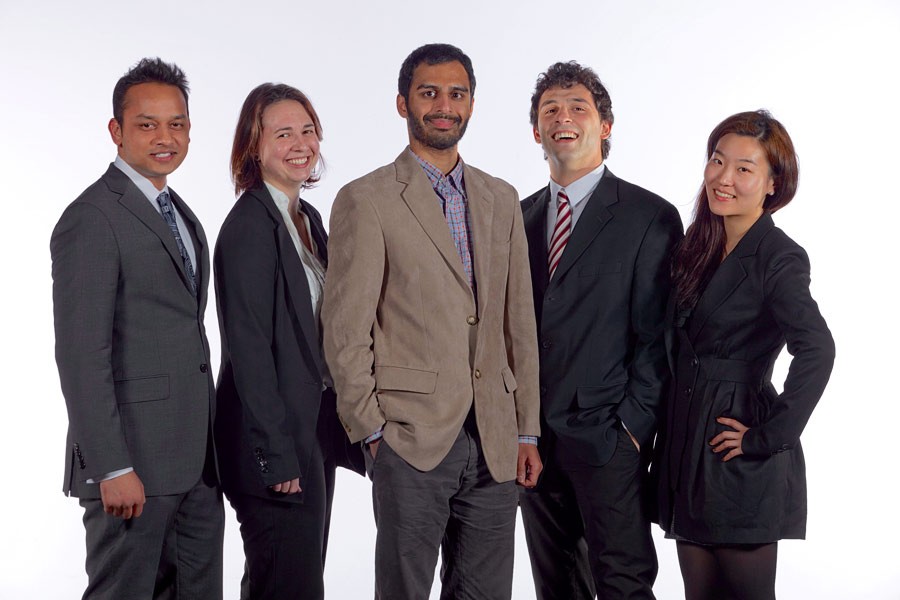A student team from Johns Hopkins won the $10,000 first prize in the Fourth Annual Biotechnology Conference and Case Competition held at Wake Forest University in Winston-Salem, N.C. Eight student teams from leading American universities were assigned a business problem by competition co-sponsor Boston Scientific, a Massachusetts-based medical equipment company. They were asked to create a strategy that would enable Boston Scientific to market its urology products in China. Given a week to prepare their proposals, the teams made the final presentations to a panel of judges on Feb. 9. Results were announced later that evening at an awards dinner.
The Johns Hopkins team was captained by Kalyan Kanakamedala, a student in the dual Master of Business Administration/Master of Public Health program run by the Carey Business School and Bloomberg School of Public Health. His teammates were Kyungmin Song, an MBA/MPH candidate who holds a medical degree; Michelle Zwernemann, a master of science in engineering candidate at the Center for Bioengineering Innovation and Design in the Whiting School of Engineering; Robin Kabir, a student in the Carey School's Global MBA program; and Nicolae Done, a doctoral candidate in health economics and policy at the Bloomberg School.
Students on the team said the broad range of their specialties and international experiences were pivotal to their success in the competition.
"All of the teams offered pretty similar business plans, but I feel ours stood out because we were able to offer detailed steps and analyses that would help the company realize its goal," Song says. "We looked closely at the risks and challenges, and how to mitigate them. We had details and insights that I don't think the other teams had, and that made a big difference."
"We gave Boston Scientific ideas that they could actually implement right away," Kabir says. "Anytime you come up with a strategy, you have to rationalize it with very thorough data, and we provided that."
Kabir partly credited his readiness for the competition to his recently completed experience in the Carey Business School's Discovery to Market technology transfer course. In the yearlong course, Carey students learn the complex process of evaluating scientific discoveries (most of them made by Johns Hopkins researchers) and determining their potential for commercialization.
The Johns Hopkins students focused not only on the content of their 25-minute presentation (including a 10-minute Q&A with the judges) but also on its form. Kabir says they rehearsed the presentation to ensure that even the physical movements of the team members reflected thoughtful planning. "We had a good flow," he says.
Wake Forest University students took second place and a $5,000 prize, while the University of Florida team finished third, earning $2,000. Honorable mention awards of $500 each went to teams from Northwestern University; the University of California, Berkeley; the University of California, Los Angeles; the University of California, San Diego; and the University of North Carolina, Chapel Hill.
Len Preslar, Distinguished Professor of Practice and executive director of Health Management Programs at the Wake Forest University Schools of Business and a faculty adviser for the event, said at the awards dinner, "The Biotech MBA case competition is unique in that it unites students from a variety of educational backgrounds to solve a strategic challenge. The quality of the presentations was very impressive in their analyses and recommendations."
Addressing the teams, Preslar added, "Take advantage of these learning opportunities as they will surely benefit you in your careers."
In addition to Boston Scientific, the event's sponsors were Wake Forest Baptist Health, Banner Pharmacaps, Benefit Advocates, BlueCross BlueShield of North Carolina, Bourne Partners, Cornerstone Health Care, Covidien, Merz Pharmaceuticals, North Carolina Biotechnology Center, Sanofi, and TransTech Pharma.








